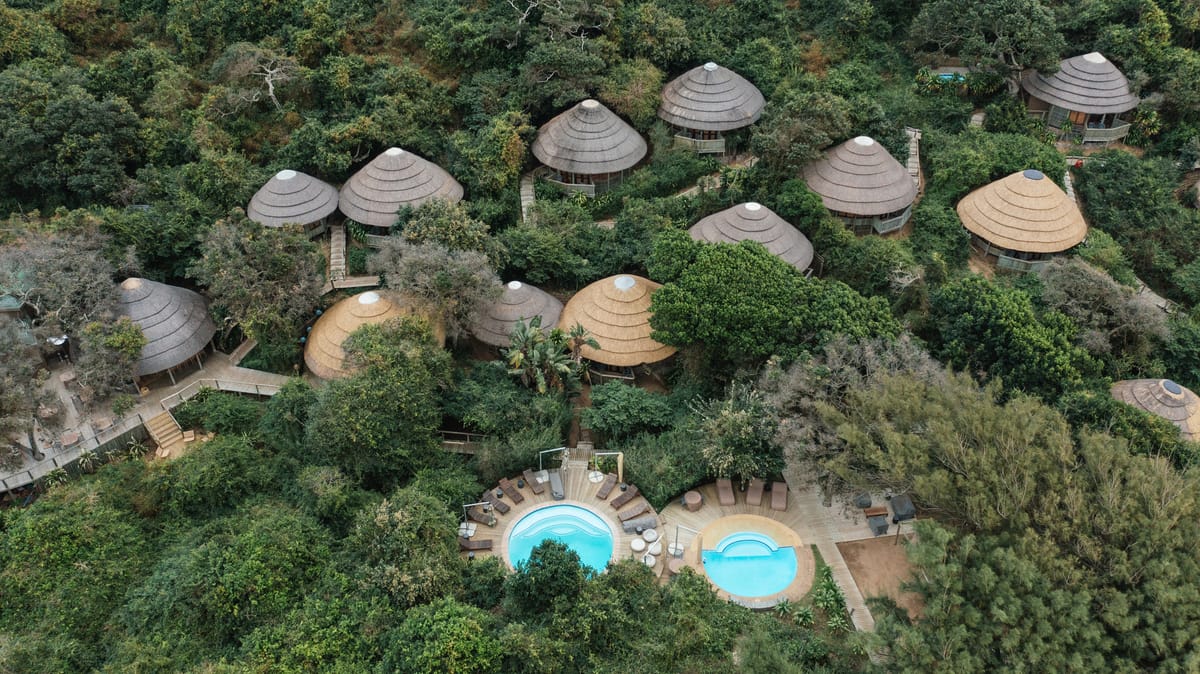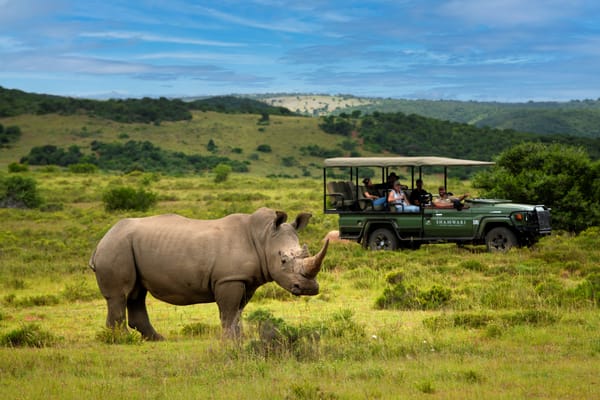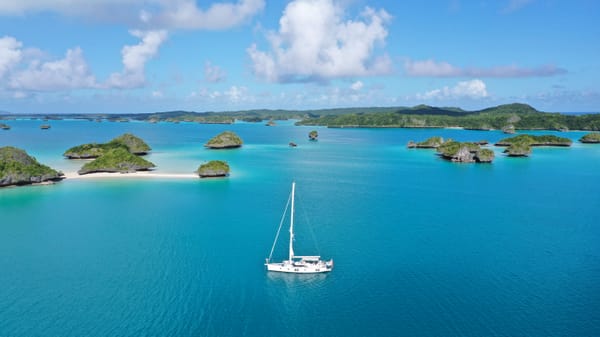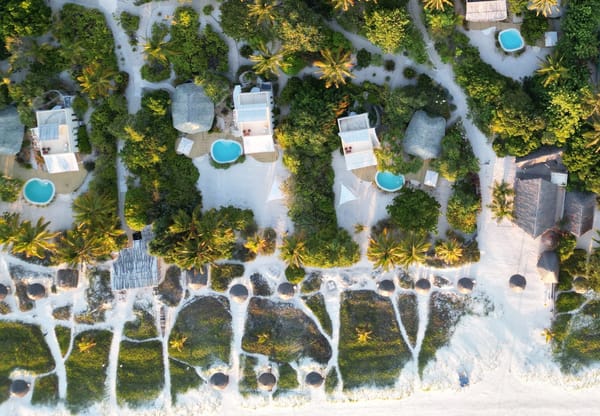Southern Africa’s Wild Edges: Where Conservation Shapes the Journey
Southern Africa’s Wild Edges, where travel leaves places better with thriving wildlife and empowered communities through conservation.

The first thing you notice is the quiet. Not an absence of sound, nature doesn’t do silence, but the absence of engines, sirens, and the constant static of cities. In their place: the slap of waves on sand, the rustle of coastal forest in the wind, and, somewhere far off, the slow, deliberate scrape of a turtle digging her nest.
This is Thonga Beach Lodge, tucked deep into the dune forest of South Africa’s iSimangaliso Wetland Park. It’s one of those places you can’t stumble across; you have to mean to get here, and that’s part of the magic. The road narrows until it’s more track than road, branches brushing the sides of the vehicle, sunlight slicing through in thin beams. Then, with almost no warning, the trees fall away and the Indian Ocean takes over your entire field of vision; blue to the horizon, breakers rolling in with a steady rhythm that feels ancient.
Thonga is one of two lodges, alongside Tsowa Safari Island in Zimbabwe, that redefine what luxury travel can mean in Southern Africa. They’re not just beautiful destinations; they’re deeply rooted in their landscapes, built to protect rather than dominate, and tied to the communities that have called these wild places home for generations.
Thonga Beach Lodge – The Ocean’s Edge
Thonga’s setting is spectacular: 25 miles of untouched shoreline, hemmed in by vegetated dunes and forest alive with bird calls. The lodge itself hides in the forest, its wooden walkways sinking softly into sand, leading to suites designed to merge with the trees rather than clear them away. The effect is one of immersion; you’re not staying beside the forest, you’re in it.
From November to March, this beach becomes the stage for a nightly drama that has played out for millions of years. Loggerhead and leatherback turtles, some weighing more than 400 kilograms, emerge from the surf to nest, their bulk moving awkwardly on land, flippers flinging arcs of sand behind them. It’s the kind of encounter that instills a sense of awe and makes you feel small in the best possible way. Led by trained marine guides from the nearby village of Mabibi, guests can witness this by moonlight. The guides know where to look and how to approach without disturbing the turtles; it’s clear from their careful movements and quiet tones that this is more than a tourist activity; it’s a form of reverence.
From June through August, Southern right whales and humpback whales start their long migration from the icy waters of Antarctica, appearing along the coast in growing numbers. By August, the spectacle reaches its peak; humpbacks in particular put on an unforgettable show, breaching, tail-slapping, and rolling in the shallows as they make their way north to breed and calve in warmer waters. Come October and November, the incredible journey reverses; mothers can often be spotted guiding their playful calves southward, offering one last chance to witness their graceful power before they disappear into the Southern Ocean once more.
If you come for the turtles, time your visit for nesting season, when loggerhead and leatherback mothers heave themselves ashore under starlit skies. But Thonga rewards year-round: summer months bring warm seas for diving and snorkeling over neon reefs; winter’s drier, cooler days are perfect for forest walks and cultural excursions to Mabibi; each season revealing a different facet of this wild coastline’s charm.
The lodge’s connection to the village runs far deeper than tourism. Many of the staff grew up here, playing in these same rock pools, fishing from the beach. Over the years, entry-level jobs have evolved into skilled careers: kitchen helpers training as dive masters, maintenance workers becoming marine guides. Through the Isibindi Foundation, Thonga supports school programs in conservation, funds waste management projects, and offers seasonal employment that keeps people connected to their home rather than chasing work elsewhere.
The activities here are as varied as the ecosystem itself. Diving is a major draw; the offshore reefs are among the most pristine in South Africa, with visibility often stretching 30 meters and fish life as vivid as confetti.
For those who prefer to stay dry, there are guided forest walks, birding excursions (look for the rare green twinspot), and canoe trips on Lake Sibaya, South Africa's largest freshwater lake Even idleness feels active here: watching the tide shift from your deck, the air heavy with salt and the smell of sun-warmed vegetation, is its kind of exploration.
Meals are unpretentious but rooted in place: line-caught fish grilled simply, tropical fruit from the local market, curries that blend coastal spice with South African tradition. Dinner is served under the stars, the forest as a dark wall beyond the lantern light, the waves a constant presence just out of sight.
It’s easy to think of Thonga as remote, but the truth is it’s deeply connected to its ocean, to its forest, and to the people who’ve always been part of both.
Tsowa Safari Island – Life on the Zambezi
A thousand kilometers north, the landscape shifts entirely. The ocean’s restlessness gives way to the Zambezi River’s slow authority, its current moving like molten metal under the sun. Tsowa Safari Island sits in the middle of that current, a private slip of forest and sand inside Zimbabwe’s Zambezi National Park.
Getting here is part of the charm. You arrive at the riverbank, your bags loaded into the boat, and push off into water that feels more alive than still. Hippos rise and sink like drifting boulders. A fish eagle calls from somewhere above. The island appears slowly, a fringe of green growing larger until you can see the dock, the welcome wave from staff, and the flicker of canvas roofs through the trees.
There are only eight tented suites here, with the river deck tents raised on stilts to keep the floodplain intact and shaded by towering waterberry and jackalberry trees. Nothing was felled to make room for them; the builders mapped every tree before laying a foundation. Paths curve naturally, and the structures themselves are as open to the air as possible, cooled by cross-breezes rather than machinery. Solar panels hum quietly, water is filtered from the river, and there’s no plastic in sight.
Life here follows the river’s rhythm. Mornings might begin with coffee on your deck as the mist lifts from the water. Canoe safaris glide into narrow channels, where malachite kingfishers dart low over the surface and crocodiles bask on sandy banks.
Afternoon game drives head into Zambezi National Park, a mosaic of mopane woodland, riverine forest, and open grassland; home to elephants, buffalo, giraffe, and the occasional lion or wild dog. Birdlife is exceptional: Pel’s fishing owl, African finfoot, and dozens of migratory species that arrive between October and March. If you’re here for birding, this is your window; if it’s big-game drama you’re after, the dry season offers the most apparent wildlife sightings as animals gather along the river.
Afternoons tend to slow down. You might find yourself in a hammock or reading on the shaded deck of the main lodge. Later, there’s the ritual of the sunset boat cruise: drifting with the current, a gin and tonic in hand, the river burning orange under the sky.
Like Thonga, Tsowa’s presence benefits more than its guests. A conservation levy on every stay supports anti-poaching patrols, community training, and environmental education. Many of the staff come from nearby villages and have been part of the team since the lodge opened. Their knowledge of the river and bush shapes the guest experience as much as the scenery itself.
Evenings gather around the firepit. Some nights it’s just the crackle of wood and the distant grunt of hippos; other nights, stories flow, of floods that reshaped the riverbanks, of elephants who return to the same spot year after year. The night sky here is a flood of stars, the Milky Way so bright it casts shadows.
A Shared Ethos
On paper, Thonga Beach Lodge and Tsowa Safari Island couldn’t be more different; one coastal, one riverine; one focused on marine life, the other on savannah wildlife. But they share a philosophy that’s become rare: travel should leave places better than it found them.
Both belong to the Isibindi Africa Lodges collection, founded nearly three decades ago by Brett and Paige Gehren. The Gehrens left conventional careers to build lodges that integrate into their environments and strengthen the communities around them. Today, their portfolio spans coastal retreats, safari camps, and cultural stays across Southern Africa, all built on the same foundation: conservation, community, and a deep respect for place.
In an age where “eco-friendly” can mean little more than a half-hearted recycling bin in the lobby, these lodges stand out. Their sustainability isn’t a side project; it’s the main story. The result is travel that doesn’t just consume experiences but contributes to the survival of the landscapes and cultures that make those experiences possible.
And perhaps that’s the most compelling luxury of all: knowing that, while you slept, a turtle laid her eggs undisturbed; while you sipped your morning coffee, a child in a nearby village learned to identify her first bird; while you watched elephants cross the Zambezi, anti-poaching patrols funded by your stay were out protecting the next generation.
That’s the kind of story worth traveling for.





